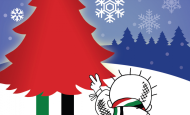O Boycott All ye Faithful: How Anti-Israel NGOs Are Abusing Christmas
Overview
As in previous years, NGOs and well-known charities are exploiting the 2012 Christmas season with anti-Israel campaigns. Groups such as Christian Aid (UK), Kairos Palestine, Sabeel, War on Want (UK), Amos Trust, and Adalah-NY are once again using theological themes to advance immoral anti-Israel campaigns and, in some cases, antisemitism. These organizations often use offensive and inflammatory rhetoric in Christmas carols, holiday messages and cards, nativity scenes, and other products. Among the blatant examples, both Kairos Palestine and Sabeel invoke antisemitic imagery by linking their attacks on Israel to the ancient libel blaming the Jews for the death of Jesus (deicide).
At the same time, their messages often conspicuously omit any reference to deadly terrorism and other violence against Israelis. Many of these so-called Christmas messages highlight allegations of harm allegedly caused by the Israeli security barrier, while they remove all references linking this structure to Palestinian terrorism. In particular, they do not mention the many terrorist attacks that originated from Bethlehem, providing the impetus for extending the barrier in that area. The repeated emphasis on Bethlehem highlights the dark theological messaging.
With this abuse of holiday and religious symbols, these NGOs and charities that claim to promote moral agendas are not offering messages of peace and good cheer. Rather, their intolerant and theologically charged messages exacerbate an already polarized and violent conflict.
Many of these NGOs are funded by European and other governments. Sabeel is funded by Sweden (via Diakonia) and the Netherlands (via ICCO and Kerk in Actie); War on Want by UK, EU, and Ireland; ARIJ by EU, Switzerland, Sweden, Australia, UK, and Spain; Christian Aid by UK, Ireland, Norway, and EU. As funders, these governments are enablers and share the moral responsibility for the actions of the NGOs.
Holiday Messages
During the current holiday season, political advocacy organizations Kairos Palestine (together with ARIJ), Sabeel, and The Israel/Palestine Mission Network (IPMN) of the Presbyterian Church (U.S.A.) give prominence to religious themes, recalling a long history of antisemitic theology.
- Kairos Palestine, a Christian Palestinian group centrally involved in political warfare including BDS, published a 32-page “Christmas Alert” together with Applied Research Institute Jerusalem (ARIJ). This text includes distortions1 on the situation of Palestinian Christians, interlaced with biblically-based sermons. One of these compares the situation of the Palestinians today with the “Parable of the Vineyard and the Tenants.” This parable invokes classic antisemitic deicide themes: the tenants (the Jews) reject the word of God (the owner of the vineyard) and kill his son, causing their land to be taken from them and given to “others.” This document casts modern day Jews as the evil tenants, and the Palestinians as Jesus, whom the tenants seek to kill.
- ARIJ also produced a video Christmas message on the economic situation in the West Bank. This message is also full of false and misleading “facts,” for instance, the claim that Israel imposes a 1.5 kilometer “buffer zone” along the Gaza border. In reality, this zone was no more than 500 meters, and after “Operation Pillar of Defense” (November 2012) the buffer zone was reduced.
- In Sabeel’s annual Christmas message, Naim Ateek compares Israel to the Roman Empire, claiming that the “people of first century Palestine were looking for salvation and liberation from the oppressive yoke of the Roman Empire…Today’s Palestinians are looking for salvation and liberation from the oppressive yoke of Israel.” This antisemitic analogy, equating the Palestinians with Jesus and Israel with the evil Roman Empire responsible for his death, was also promoted on the Evangelical Lutheran Church in America website.
- Israel Palestine Mission Network, Presbyterian Church (USA), published its Daily Advent Devotional 2012, which contains theological language to demonize Jews (including I Thessalonians 2:15-16, which has historically been used for this purpose). For example: “Our Advent/Christmas traditions fit this allegory. A loving God sends prophets to Israel to guide them to justice and righteousness. The prophets are rejected, persecuted and often killed.” IPMN’s publication also alludes that Judaism is a “false religion” (p.22), promotes BDS, and falsely claims that Gaza is still occupied.
Classical antisemitic themes and images in NGO Resources, Cards, and Nativity Scenes
- As in previous years, Christian Aid is again using its Christmas materials for politicized attacks against Israel. Christian Aid has published an “Advent Journey” and “Advent Reflections,” both under the title of “Healing in this Holy Land.” These publications purport to describe the travel restrictions imposed on Palestinians to due to roadblocks and checkpoints, while completely removing the context of Palestinian terrorism that necessitates them. One of the recommended “Advent Actions” states, “In Bethlehem, where Jesus was born…there is also an enormous wall around part of the town that makes the lives of Palestinians living in Bethlehem very difficult because they cannot move freely. As you think about Mary and Joseph making the journey to Bethlehem, pray for the people who live there now and whose lives have been affected by conflict.” They also promote the work of Physicians for Human Rights-Israel (PHR-I), a radical politicized organization that claimed that Israel’s self-defense measures in Gaza during November 2012, in the face of hundreds of rocket attacks, was nothing more than an “empty show of force” in the “cynical political arena.”
- UK-based Amos Trust is advertising its annual Bethlehem Pack, “a resource to help churches talk about the current situation in Bethlehem at carol services and Christmas events.” This year’s Pack includes an “interactive reading about home demolitions” and “prayers for Gaza in light of recent events.” In Amos Trust’s distorted worldview, “If Jesus was born today in Bethlehem, the Wise Men would spend several hours queuing to enter the town” and “The shepherds, despite being residents of Bethlehem, would struggle to graze their sheep because their land would be annexed by the building of the separation wall and a lack of freedom to travel and restrictions on trade would make it very difficult for them to make a living…” Such theological references echo classical Christian antisemitism. Further, the Bethlehem Pack asserts: “The Christian community in the Holy Land is dwindling, as more and more Christians are leaving to find better lives abroad for themselves and their families.” This mendaciously ignores the increase of the Christian population in Israel over the past 15 years, and erases the role of intra-Palestinian violence and discrimination against Christians that has been driving Palestinians out of the West Bank and Gaza.
- War on Want, which receives British government funding, continues to promote its politicized Christmas cards that depict the security barrier paired with religious Christmas images. The reverse side of the card’s image includes a tendentious description: “Bethlehem is one of the many Palestinian towns devastated by Israel’s illegal Separation Wall… Bethlehem, city of peace, has been disfigured by tanks and soldiers on its streets.”
- As it did last year, the Ireland Palestinian Solidarity Campaign (IPSC) is selling its own Christmas cards with a depiction of the three wise men at the “apartheid wall”, (security barrier) claiming that “Their path would be blocked by Israel’s Apartheid Wall and it’s doubtful if they would be allowed through the checkpoints.” In addition, a second card displays the Madonna and Child, with the Madonna dressed in the Palestinian flag and star of Bethlehem in the background. The card reads, “This Christmas remember Palestine.” IPSC also sells a carved wood Nativity Scene, which is “meant to open the eyes of the world to the Wall that has turned Bethlehem – the city of Jesus’ birth – into a prison for its people…”
Christmas Carols
Several NGOs are promoting BDS (boycott, divestment, and sanctions) campaigns through politicized Christmas carols. Groups gathered outside stores selling Israeli products, using song lyrics to falsely and cynically accuse Israel of human rights violations. No mention was made of any human rights violations by Palestinian groups such as Hamas, which rules the Gaza Strip, or the Palestinian Authority.
- Adalah-NY2 held its “6th Annual Adalah-NY Anti-Apartheid Holiday Caroling” on December 15, 2012 in front of a New York jewelry store owned by Israeli businessman Lev Leviev. The protest is part of Adalah-NY’s ongoing campaign against Leviev, and invited activists to sing altered versions of traditional holiday songs. (This year, Adalah-NY added Hanukkah songs to their repertoire.) The event included false accusations of “apartheid,” as well as accusing Leviev of “destroying human lives”
- Palestine solidarity activists in Melbourne staged a BDS action as part of the “Don’t Buy Israeli Apartheid for Christmas” national week of action around Australia. The Melbourne action was organized by Students for Palestine, supported by the Coalition Against Israeli Apartheid (Melbourne), and included carols adapted to dissuade shoppers from purchasing Israeli-made products.
Footnotes
- For instance, Kairos Palestine blames Israel for a “severe water crisis” in villages near Bethlehem. This ignores the reality in which the Palestinian Authority is responsible for and mismanages water distribution in Palestinian areas, and Israel has been supplying the Palestinians with water above and beyond it legal obligations.
- Adalah-NY is not affiliated with Adalah in Israel.


